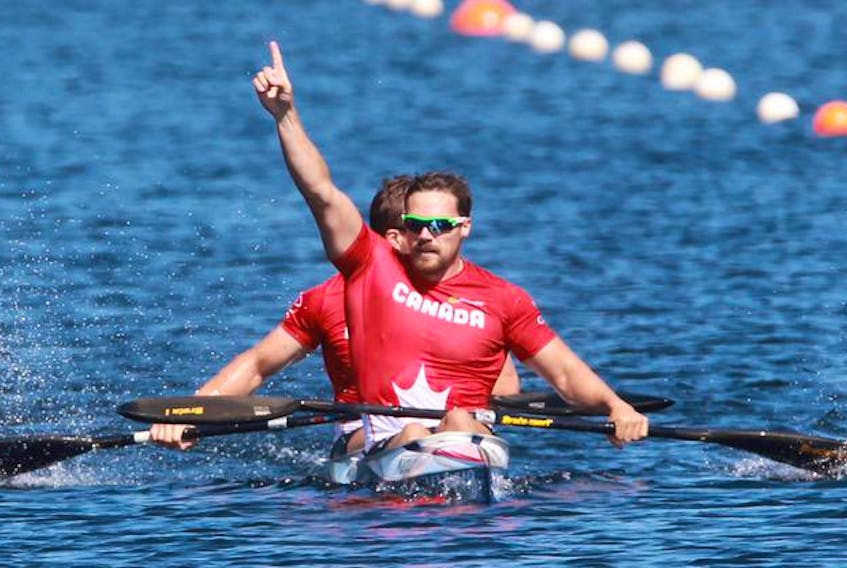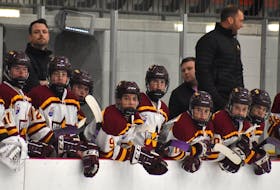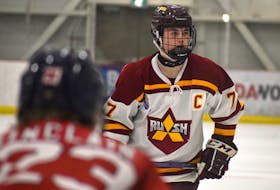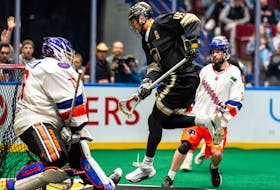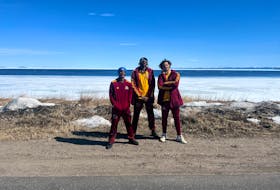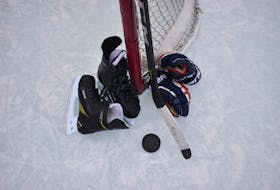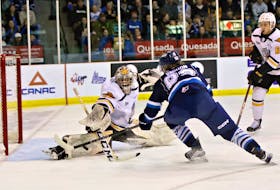Mark de Jonge was having a conversation with a friend the other day and it suddenly dawned on him that he should be in Tokyo right now.
In de Jonge’s perfect world, he would be in Tokyo preparing for his third Olympic Games as a member of Canada’s K-4 crew. But instead he is in Halifax working hard with training partner Alex Scott for the 2020 Olympics that are 367 days away due to the COVID-19 pandemic.
So what was going to his last Olympic four-year cycle turned into five years — but the 36-year-old is still up to the challenge.
“An Olympic year is stressful physically, mentally and financially,” said de Jonge, a bronze medalist in the K-1 200-metre event at the 2012 London Olympics. “It’ hard, but I guess I wouldn’t have made it as long in this sport if I hadn’t enjoyed what I was doing day-to-day. So that has kept me focused every day and doing the work.”
De Jonge is a two-time world champion in the K-1 200 but last year turned his focus to crew boats and is a key member of the Canadian K-4 that turned heads with some strong results last year in World Cup competition.
The national team veteran joined with kayakers Nicholas Matveev, Pierre-Luc Poulin and Simon MacTavish, all at least a decade younger, to form what could be a formidable boat by the Olympics next year.
“We’ve been doing a good job together,” said de Jonge. “At World Cup last year we were fourth, just missed the podium, at our first international competition in Poland and that was a really encouraging sign.
“We had some other moments of brilliance. We didn’t necessarily knock it out the park every race, but we had some really good moments. We were just looking forward to putting some more time in the boat coming into 2020 and we were ready to go.”
The foursome locked up four Olympic quota spots for Canada with a 14th-place finish in the 500-metre event at the world championships last August.
De Jonge said the crew hopes to stay together for the Olympics but expects challenges from other kayakers looking to race their way into the boat through seat challenges.
“We had some other people try to get in the boat, but the four of us remained as the fastest ones. We are going to stick together and race at (Canadian Olympic) trials.
“Mid-March was the last time we were all together and in mid-April, we were going to have our Olympic trials and we had to win a race against another K-4 and once that was done we would be nominated to the Olympic team. We were just weeks away from sealing the deal and now we are over a year away.”
It will probably be in August before de Jonge can join his teammates in a crew boat. He’s looking forward to the prospect of picking up where the left off.
“The guys are younger and they are getting faster every year. Hard to know where that is going to plateau but every time we get into a boat we were a little better. It’s really exciting because maybe this can be a medal-winning crew.
“There just didn’t seem to be any holes in our performance, I think another year of training we all just get that little bit better. At that high level, that’s all it takes to break through.”
If any kayaker knows about breakthroughs, it’s de Jonge.
His first foray at the world championships in the 200-metre K1 came in 2009 when he was 13th. He steadily improved with a sixth in 2011, a silver in 2013 and gold medals in 2014 and 2015.
“My goal has also been to do well in K1. I had also hoped to get another Olympic medal in that event, but more recently it was hard to know.”
He is doing everything in his power to ensure his body will be ready for the Olympic challenge next year as a 37-year-old.
“My body is holding up well and my fitness is great. But it’s harder because I am training with people in their early to mid-20s and they can recover quickly and go as hard they want. It’s harder to be an older athlete and try to keep up with guys that are in their prime athletically. I’ve learned over the years that you can’t go crazy all the time because you are going to pay a price for it. I’ve been a little bit smarter about how I approach things and where I put my energy and focus and where not to. That’s one benefit of getting older.”
De Jonge briefly considered retirement after the 2016 Rio Olympics where he placed seventh in his feature event. His resume was full of amazing achievements — and what more did he have to prove?
“I’ve done a lot in the sport and I could have retired after the 2016 Olympics knowing I had accomplished a lot of things and was happy to close that chapter in my life. “But I do love this sport and I chose to do another four years and it has turned into five now.”
One of the motivating factors for one more Olympic cycle was the opportunity for his four-year-old son, Max, to see him compete on that stage.
“That’s one of the reasons I did decided to go to Tokyo,” said de Jonge. “I remember some things when I was three and definitely four. To have his dad competing at the Olympics as one of his first memories is a good way to inspire him at a young age and get off on the right foot. It would be a dream of mine to do that and hopefully, that will happen.”
The International Olympic Committee released a new schedule of events for the Games next year, a good sign amid the spike of COVID-19 cases in many countries.
De Jonge admits to regularly typing Tokyo Olympics into Google for updates on the Games.
“Depending on the day, I’m optimistic or pessimistic about if it’s going to happen,” he laughed. “I will wake up and see there are some promising results for a vaccine, then you look at the cases in the (United) States, Brazil and India then maybe you think it’s not going to happen. How do you even form an idea about what is happening?
“The checking every day on Google is just me looking for some sense of direction. Just to feel like I’m in control, but the reality is, I’m not.”
De Jonge said the next year is going to be a challenge with so much uncertainty over training locations, lack of international competition and COVID-19 concerns.
So the best thing for him is to focus on the basics.
“What I’m in control of is getting in my boat every day and doing the work my coach is asking me to do.”

